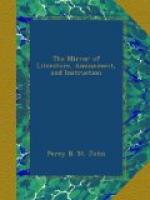new religious foundations, whilst schools, on the
other hand, began to multiply in their stead; a fact
which sufficiently marks the state of public opinion
with regard to the monasteries as places of education—for
education began now to be the desire of the day.
Schools, therefore, in the present acceptation of the
term, in Cranmer’s boyhood there were scarcely
any; and it was the crying want of them in London
that induced Dean Colet to establish that of St. Paul’s,
which, under the fostering care of Lily, the first
master, not only became so distinguished in itself,
but set the example, and prepared the way, by its
rules and its grammar, for so many others which followed
in its wake. Edward VI.; with the natural feeling
of a boy fond of knowledge, and himself a proficient
for his years, was aware of the evil, and projected
the remedy. Colet might be his model—but
he was embarrassed in his means by courtiers, who
were for ever uttering the cry of the horse-leech’s
daughters; and, besides, his days were soon numbered.
Cranmer, who perhaps remembered the obstacles in his
own way, and who certainly foresaw the great calamity
of an ignorant clergy, pressed for the establishment
of a school in connexion with every cathedral—a
school, as it were, of the prophets—where
boys intended for holy orders might be brought up
suitably to the profession they were about to adopt,
and where the bishops might ever find persons duly
qualified to serve God in the church. But Cranmer
was overruled, and a measure, which might have helped
to catch up the church before it fell into that abyss
of ignorance which seems to have immediately succeeded
the Reformation, (the natural consequence of a season
of convulsion and violence,) was unhappily lost.
It was not till the reign of Elizabeth that the evil
was at all adequately met, nor fully indeed then, as
the deficiency of well-endowed schools at this day
testifies. Still much was at that time done.
The dignitaries and more wealthy ecclesiastics of the
reformed Church bestirred themselves and founded some
schools. Many tradesmen, who had accumulated
fortunes in London, (then the almost exclusive province
of commercial enterprise,) retired in their later
years to the country-town which had given them birth,
and gratefully provided for the better education of
their neighbours, by furnishing it with a grammar-school.
And even the honest yeoman, a person who then appears
to have appreciated learning, and often to have brought
up his boy to the church, united in the same praiseworthy
object. In such cases application was usually
made to the Queen for a charter, which was granted
with or without pecuniary assistance on her own part;
and whoever will examine the dates of our foundation
schools, will find a great proportion of them erected
in that glorious reign.




